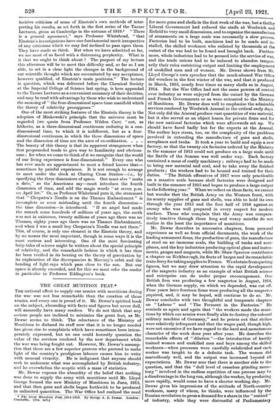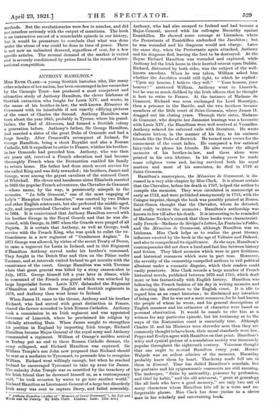THE GREAT MUNITION FEAT.* Taz national effort to supply our
armies with munitions during the war was not less remarkable than the creation of those armies, and every one is proud of it. Mr. Dewar's spirited book on the subject, abounding with facts and figures but never dull, will assuredly have many readers. We do not think that any serious people are inclined to minimize the great feat, as Mr. Dewar seems to think. The reluctance of the Ministry of Munitions to disband its staff now that it is no longer needed has given rise to complaints which have sometimes been intem- perately expressed, but no one could honestly question the value of the services rendered by the new department while the war was being fought out. However, Mr. Dewar's assump- tion that there are a few superior persons who pretend to make light of the country's prodigious labours causes him to write with unusual vivacity. He is indignant that anyone should seek to underrate what was accomplished by British industry, and he overwhelms the sceptic with a mass of statistics.
Mr. Dewar exposes the absurdity of the belief that nothing was done to supply the army with munitions until Mr. Lloyd George formed the new Ministry of Munitions in June, 1915, and that then guns and shells began forthwith to be produced in unlimited quantities. The War Office had realized the need
• The Great Munition Feat. 1914-1918. By George A. B. Dew. London:
for more guns and shells in the first week of the war, but a thrifty Liberal Government had reduced the staffs at Woolwich and Enfield to very small dimensions, and to organize the manufacture of armaments on a large scale was necessarily a slow process. Factories had to be built, machines had to be made and in- stalled, the skilled workmen who enlisted by thousands at the outset of the war had to be found and brought back. Further- more, whole industries had to be pressed into the service of war, and the trade unions had to be induced to abandon tempor- arily their rules restricting output and limiting the employment of unskilled men and of women. Mr. Dewar shows from Mr. Lloyd George's own speeches that the much-abused War Office did wonders in the first winter of the war, and that it produced in March, 1915, nearly four times as many shells as in August, 1914. But the War Office had not the same powers of control over industry as were enjoyed from the outset by the German and French Governments or as were entrusted to the Ministry of Munitions. Mr. Dewar does well to emphasize the admirable services rendered by Woolwich Arsenal in the critical early days.
Not only did the Arsenal produce vast quantities of war material, but it also served as an object lesson for private firms and for the new national factories which were afterwards set up. We should haie fared badly but for the experts at the Arsenal. The author lays stress, too, on the complexity of the problems involved in extending the manufacture of guns and shells, aeroplanes and tanks. It took a year to build and equip a new factory, so that the twenty-six factories ordered by the Ministry in the summer of 1915 could not produce on a large scale until the Battle of the Somme was well under way. Each factory contained a mass of costly machinery ; railways had to be made to bring raw material and coal, and to take away the finished products ; the workers had to be housed and trained for their duties. " The British offensives of 1917 were only practicable on a massive scale because shell factories were designed and built in the summer of 1915 and began to produce a large output in the following year." When we reflect on these facts, we cannot but wonder that the British Army on the Western front, with its scanty supplies of guns and shells, was able to hold its own through the year 1915 and the first half of 1916 against an enemy who was well prepared in every respect for modern warfare. Those who complain that the Army was compara- tively inactive through these long and weary months do not realize in the least the importance of munitions.
Mr. Dewar describes in successive chapters, from personal experience as well as from official documents, the work of the leading armament firms, the production of guns, the manufacture of steel on an immense scale, the building of tanks and aero- planes, and the key industries producing optical glass and instru- ments, gauges and magnets, while Mr. Shaw Sparrow contributes a chapter on Richborough, its fleets of barges and its remarkable train-ferry for taking supplies to France. We abstain from quoting figures, but we may draw attention to the rapid development of the magneto industry as an example of what British science and enterprise can do under proper encouragement. One British firm was producing a few magnetos in August, 1914, when the German supply, on which we depended, was cut off. Four years later fourteen firms were producing all the magnetos required, and, it may be hoped, will continue to do so. Mr.
Dewar concludes with two thoughtful and temperate chapters on " Labour " and " The Ferment in the Factories." He reminds us again and again that " the workers made the muni- tions by which our armies were finally able to destroy the colossal military machine of Germany," and he points out that strikes were relatively infrequent and that the wages paid, though high, were not excessive if we have regard to the hard and monotonous character of the work done year after year. He describes the remarkable effects of "dilution "—the introduction of hastily trained women and unskilled men and boys among the skilled workmen—when processes were carefully subdivided and each worker was taught to do a definite task. The women did marvellously well, and the output was increased beyond all expectations. Mr. Dewar sees that there is another side to the question, and that the " dull level of ceaseless grinding mono- tony" involved in the endless repetition of one process may Fe a disadvantage in the long run, although the worker, by producing more rapidly, would come to have a shorter working day. Mr.
Dewar gives his impressions of the attitude of North-country workmen, many of whom, he thinks, were influenced by the Russian revolution to press a demand for a share in the " control " of industry, while they were distrustful of Parliamentary methods. But the revolutionaries were few in number, and did not interfere seriously with the output of munitions. The book is an instructive record of a remarkable episode in our history, but it would be premature to conclude that what was done under the stress of war could be done in time of peace. There is not now an unlimited demand, regardless of cest, for a few specific articles. The normal demand of the market is varied and is severely conditioned by prices fixed in the 'stress of inter- national competition.



































 Previous page
Previous page